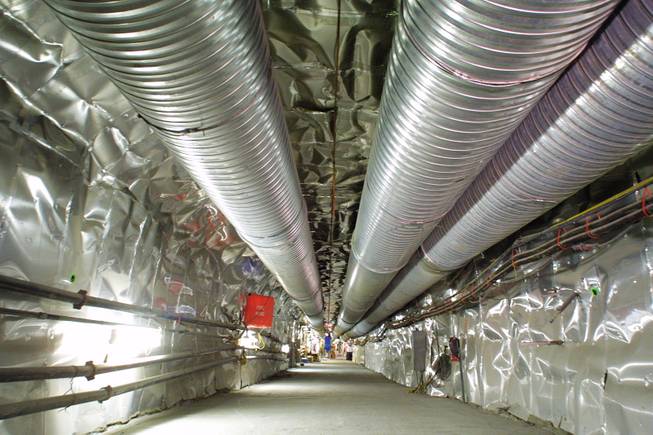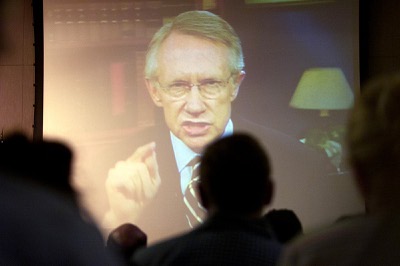
Las Vegas Sun
This is a tunnel seen during a public open house of Yucca Mountain on Saturday, Nov. 3, 2001.
Friday, March 6, 2015 | 2 a.m.
Related news
In Nevada, nuclear waste and the possibility of storing it in Yucca Mountain are never far from state leaders' minds.
But it's a niche issue for the rest of the nation. Gone are the days of Bonnie Raitt concerts calling for a ban on all nuclear energy, a passionate response to a 1979 partial meltdown at the Three Mile Island reactor in Pennsylvania.
"For kids today, 'TMI' doesn't mean 'Three Mile Island,'" said John Keeley of the trade group Nuclear Energy Institute. "It means 'Too Much Information.'"
That could change. There are renewed stirrings in Congress to push highly radioactive nuclear waste to Yucca Mountain, and anti-nuclear activists are gearing up for a re-education campaign in response.
They have their work cut out for them to make a new generation of Congress and the average American care about keeping nuclear waste out of Nevada.
"We're starting from zero," said Mary Olson, a nuclear waste specialist with the grassroots anti-nuclear nonprofit Nuclear Information Resource Service
Here's a look at where the Yucca Mountain project stands now and how activists are retooling their message to keep it from advancing.
Where the project stands now
Depending on whom you talk to, Yucca Mountain is either dead, or just stalled.
In 1987, Congress and President Ronald Reagan approved using the mountain about 90 miles northwest of Las Vegas to permanently store tens of thousands of metric tons of spent nuclear fuel sitting in caskets at temporary storage sites alongside reactors across the nation.
After Nevada Democrat Harry Reid became Senate majority leader in 2007, he blocked what he called "the Screw Nevada bill." He was aided in part by getting Barack Obama to promise to put the brakes on the project after Obama became president in 2009.
But the bill remains the law of the land, which is why in 2013, a federal court ordered the Nuclear Regulatory Commission to pursue a license to build it, despite the fact the Department of Energy pulled its application for the project in 2010.
In his eight years as majority leader, Reid starved the agency of new funds to carry out the license proposal.
But there's still some money in the bank. The NRC has spent $15 billion so far to pursue the license, and in January finished a five-volume safety report declaring Yucca Mountain can safely hold nuclear waste for a million years.
Anti-Yucca opponents seized on the report's caveat: That the government would first need to gain rights to land and water around the mountain.
"This project will never see the light of day and everyone should accept that and move on," Reid responded.
What needs to happen to move the project forward
Both sides agree a nuclear waste repository anywhere in the nation is still at least two decades away from being built.
The NRC still needs to conduct an environmental review of the project and hold licensing hearings. In February, Yucca proponents got a big win when Chairman Stephen Burns said there's still enough money in the commission's budget to do the environmental review.
This is where Congress comes in. Congress could give the NRC more money to continue with the licensing process, which Burns told a Senate panel this week would cost the agency about $330 million.
It's an attractive option for lawmakers of both parties who would like to see spent nuclear fuel in their backyards buried in Yucca Mountain.
Rep. John Shimkus, an Illinois Republican, represents a state holding more than nine thousand metric tons of spent nuclear fuel, according to the NEI. He says he will introduce a bill this summer moving forward the project, and he plans to visit Yucca Mountain this year to drum up support. Among other things, the bill would attempt to resolve those outstanding land and water rights, and observers estimate it could have enough support to pass the House of Representatives.
Shimkus' cause is helped by the fact that two of Nevada's House Republicans, Rep. Mark Amodei of Northern Nevada and Rep. Cresent Hardy of central Nevada, have expressed a willingness to discuss the project.
Hardy has said he'd support Yucca Mountain "if everything were safe." Amodei told the Mesquite News in February state leaders shouldn't just scream "no" on Yucca and suggested he'd be open to a deal that allowed it to move forward in exchange for federal funding to build the proposed interstate highway I-11.
In the newly Republican Senate, observers also say there could be enough Democratic senators to join Republicans to approve some kind of nuclear waste legislation, whether that's Yucca Mountain or establishing an interim storage facility, like one being touted in West Texas.
And if Obama vetoes any kind of Yucca legislation, as he's promised to do, a new president supportive of the project could sign off in 2017.
Anti-nuclear activists on high alert
It's a battle that never seems to end for anti-nuclear activists, like those at the Nuclear Information Resource Service.
Back in 1994, they dreamed up a campaign that suddenly made Yucca Mountain a local issue in almost every state. Working with activists in Nevada, the organization released detailed maps of the path those fuel rods would take from their temporary storage at nuclear sites across the country to Yucca Mountain.
The trucks and trains filled with hazardous waste would wend their way through your neighborhood, near your school and past your community center, activists declared in 100 simultaneous press conferences across the country, dubbed "Mobile Chernobyl."
"Something that's bad for one is bad for all," said Judy Treichel, of the grassroots anti-Yucca Nevada Nuclear Waste Task Force. "But it's very difficult to get that message out."
In 2015, the anti-Yucca champions are taking a more digital route to re-engage lawmakers and average Americans.
They're sending supporters monthly email blasts asking them to write their lawmakers opposing Yucca Mountain. The letters will cover issues such as transportation routes for the waste and science they claim makes Nevada a bad spot for it.
If momentum for Yucca Mountain does pick up in Congress, anti-nuclear activists could face an uphill battle. But they've faced those before.
"We view Yucca as failed," Olson said, "and we are defending that victory."


Join the Discussion:
Check this out for a full explanation of our conversion to the LiveFyre commenting system and instructions on how to sign up for an account.
Full comments policy